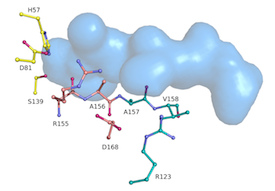 |
|
| Celia Schiffer, PhD |
Amidst euphoria about the blockbuster hepatitis C drugs Sovaldi and Harvoni, UMass Medical School biophysicist Celia Schiffer, PhD, said there still remains a challenge since the drugs are not effective for all of the 150 million people worldwide who are infected with drug resistant strains of hepatitis C virus (HCV) or other variants of the disease.
“HCV around the world has many different genotypes,” explained Dr. Schiffer, professor of biochemistry & molecular pharmacology, and founder and director of the UMMS Institute for Drug Resistance. “Many infections do not respond well to the new drugs, which are genotype-specific.”
The Schiffer laboratory has contributed seminal discoveries relating to drug resistance in HIV and, more recently, HCV, including direct collaborations with pharmaceutical companies that have developed the new drugs. Now, with a $2.5 million, 5-year renewal of National Institutes of Health funding for her ongoing HCV research, Schiffer and collaborators will build on this foundation to expand efforts to overcome drug resistance in hepatitis C, as well as other viruses such as dengue, which infects 100 million people worldwide.
With her original five-year hepatitis C research funding and more than a decade of extensive funding for related studies with HIV, leading three NIH project grants and three other research project renewals, Schiffer identified and developed the concept of the “substrate envelope.” She realized that most resistance occurs in drug targets where the drug protrudes beyond what is absolutely necessary for the drug target to carry out its biological activity.
“If a drug contacts these regions they are more likely to develop resistance in a quickly evolving disease, such as HIV or HCV, as the virus can still survive while being resistant to the drug,” she said. Her concept is to develop drugs that are less susceptible to resistance, “sort of between a rock and a hard place” in such a way that evolution of resistance would compromise the biological activity.
 |
|
| Dr. Schiffer identified and developed the concept of the “substrate envelope.” |
Specifically, with the continued funding, Schiffer and colleagues will build on past discoveries to further elucidate the molecular mechanisms by which resistance occurs in the HCV NS3/4A protease. This protease is a key HCV drug target for which there are direct acting antiviral drugs, and she is creating new strategies to design novel drugs that will be less susceptible to resistance.
“Our previous multidisciplinary research on the HCV NS3/4A protease gives us the foundation for developing new strategies for the development of robust inhibitors, using what we call the substrate envelope, that are cross-genotypic and avoid resistance,” she said. “In this renewal we will continue to develop these ideas and extend them to other quickly evolving disease targets such as dengue, NS2B/3.”
Next steps will include examining sites outside of the active site that also contribute to drug resistance.
“The worst of the mutations are just outside the substrate envelope, but there are many others, which confer resistance indirectly,” said Schiffer. “The role of these sites and how they confer resistance is still not clear. We think it may have to do with movement and flexibility in the biological molecules.”
With the extension to dengue in this next phase of the research, inhibitors will be designed to other widespread viruses for which no drug treatments exist. Similar viruses include West Nile Virus and Eastern Equine Encephalitis, whose prevalence in the United States have grown, as well as dengue and Yellow Fever, which infect millions worldwide.
“The lessons we learn can be extended to other quickly evolving diseases: infectious diseases and cancers,” said Schiffer. “Working with other labs and drug companies to understand both how drug resistance works and how to avoid it, we hope to develop smarter strategies to address drug resistance during, instead of after, the drug design process.”
Related links on UMassMedNow:
NIH awards Schiffer $7.9 million to attack drug resistance
Expert’s Corner: Celia Schiffer, PhD, on drug resistance
Djade Soumana awarded NIH grant and HOPE Scholarship: Schiffer lab member strives to reduce disparities in hepatitis C treatment
New initiative to build culture of drug development entrepreneurship